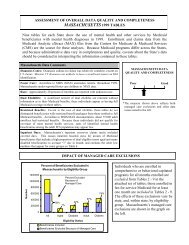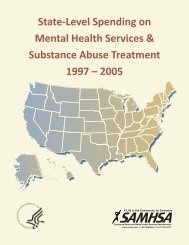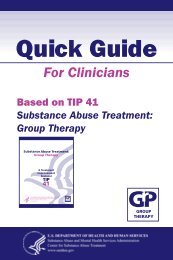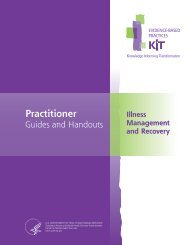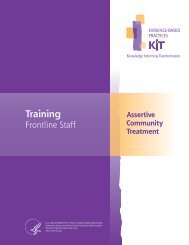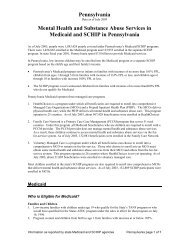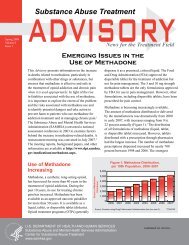Practice Guidelines: Core Elements for Responding to Mental Health
Practice Guidelines: Core Elements for Responding to Mental Health
Practice Guidelines: Core Elements for Responding to Mental Health
You also want an ePaper? Increase the reach of your titles
YUMPU automatically turns print PDFs into web optimized ePapers that Google loves.
7. crisis services are provided by individuals with appropriate training and<br />
demonstrable competence <strong>to</strong> evaluate and effectively intervene with the<br />
problems being presented. Crisis intervention may be considered a high-end<br />
service, that is high-risk and demanding a high level of skill.Within the course of<br />
a psychiatric emergency, various types of crisis interventions may occur—some<br />
by healthcare professionals, some by peers and some by personnel (such as police)<br />
who are outside of healthcare.Throughout, the individual experiencing a mental<br />
health crisis should be assured that all interveners have an appropriate level of<br />
training and competence.What that means may vary considerably between<br />
scenarios. For instance, a significant number of instances of police involvement<br />
with individuals in mental health crises result in injuries or even death. 15<br />
Accordingly, some police departments have taken special measures <strong>to</strong> train offcers<br />
in identifying and de-escalating mental health crises. Many have also established<br />
links with mental health professionals who can provide timely on-site assistance.<br />
These ef<strong>for</strong>ts have required police and health care professionals <strong>to</strong> connect across<br />
traditional bureaucratic boundaries.<br />
8. individuals in a self-defined crisis are not turned away. People who seek<br />
crisis services but do not meet the service criteria of an organization should<br />
receive meaningful guidance and assistance in accessing alternative resources.This<br />
is particularly applicable in organizations or programs that carry out a screening<br />
or gatekeeping function. For instance, it is not suffcient, upon determining that<br />
an individual fails <strong>to</strong> meet the criteria <strong>for</strong> hospitalization, <strong>to</strong> tell the individual or<br />
family members <strong>to</strong> make contact again if the situation worsens. Such practices<br />
tacitly encourage the escalation of crises. Individuals and their families should<br />
be assisted in accessing services and supports that resolve issues early on, and an<br />
organization providing screening or gatekeeping services should be fluent with<br />
alternatives <strong>for</strong> when service thresholds are not met.When these alternatives are<br />
lacking, the organization should consider this a problem in care and take action<br />
accordingly. Likewise, an organization providing early intervention that routinely<br />
receives referrals from hospital gatekeepers might consider improving its outreach<br />
so that individuals seeking help are more likely <strong>to</strong> access their services directly,<br />
without placing demands on programs designed <strong>for</strong> late-stage emergencies.<br />
9. interveners have a comprehensive understanding of the crisis. Meaningful<br />
crisis response requires a thorough understanding of the issues at play.Yet, <strong>for</strong> people<br />
with serious mental illnesses, interventions are commonly based on a superficial set of<br />
facts: behaviors are seen <strong>to</strong> present a safety issue, the individual has reportedly failed<br />
<strong>to</strong> take medications as prescribed, or an encounter with the police has occurred.<br />
An appropriate understanding of the emergency situation not only includes an<br />
appreciation <strong>for</strong> what is happening at the moment, but also why it is happening and<br />
how an individual fares when he or she is not in crisis. Crises—particularly recurrent<br />
crises—likely signal a failure <strong>to</strong> address underlying issues appropriately. When crisis<br />
intervention occurs outside of the individual’s cus<strong>to</strong>mary setting, such as in a hospital<br />
emergency department or a psychiatric inpatient unit, it may be challenging <strong>to</strong> gain a<br />
good picture of the individual’s circumstances.<br />
t<br />
An Alternative Approach<br />
“The Hospital Diversion<br />
Program at the ROSE<br />
HOUSE is currently available<br />
<strong>to</strong> residents of Orange<br />
and Ulster counties [New<br />
York State]. This peer-operated<br />
house is designed<br />
<strong>to</strong> assist fellow peers in<br />
diverting from psychiatric<br />
distress, which may lead <strong>to</strong><br />
a hospitalization. The program<br />
is located in a threebedroom<br />
home set up and<br />
furnished <strong>for</strong> com<strong>for</strong>t.The<br />
house is equipped with a<br />
variety of traditional selfhelp<br />
and proactive <strong>to</strong>ols <strong>to</strong><br />
maintain wellness. Trained<br />
peer companions are the<br />
key ingredients in helping<br />
others learn self-help<br />
<strong>to</strong>ols. Peer companions<br />
are compassionate, understanding<br />
and empowering.<br />
We exist <strong>to</strong> fill a gap in<br />
the mental health system<br />
that can brake the cycle of<br />
going from home <strong>to</strong> crisis<br />
<strong>to</strong> hospital.<br />
The ROSE HOUSE offers<br />
a stay of up <strong>to</strong> five days <strong>to</strong><br />
take control of your crisis<br />
or potential crisis and develop<br />
new skills <strong>to</strong> maintain<br />
your wellness. Peer<br />
companions staff the house<br />
24 hours a day <strong>to</strong> address<br />
the needs of guests as they<br />
arise. Participation in the<br />
program is completely voluntary<br />
and free of charge.<br />
You are free <strong>to</strong> come and<br />
go as you please. We also<br />
will maintain contact and<br />
support <strong>for</strong> you, at your<br />
request, after you finish<br />
your stay. We have found<br />
that occasional calls and<br />
visits rein<strong>for</strong>ce recovery<br />
and self determination.”<br />
From the website of Projects <strong>to</strong> Empower and<br />
Organize the Psychiatrically Labeled (PEOPLe,<br />
Inc.) at: http://www.projects<strong>to</strong>empower.org<br />
9



